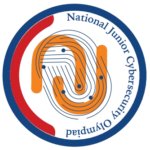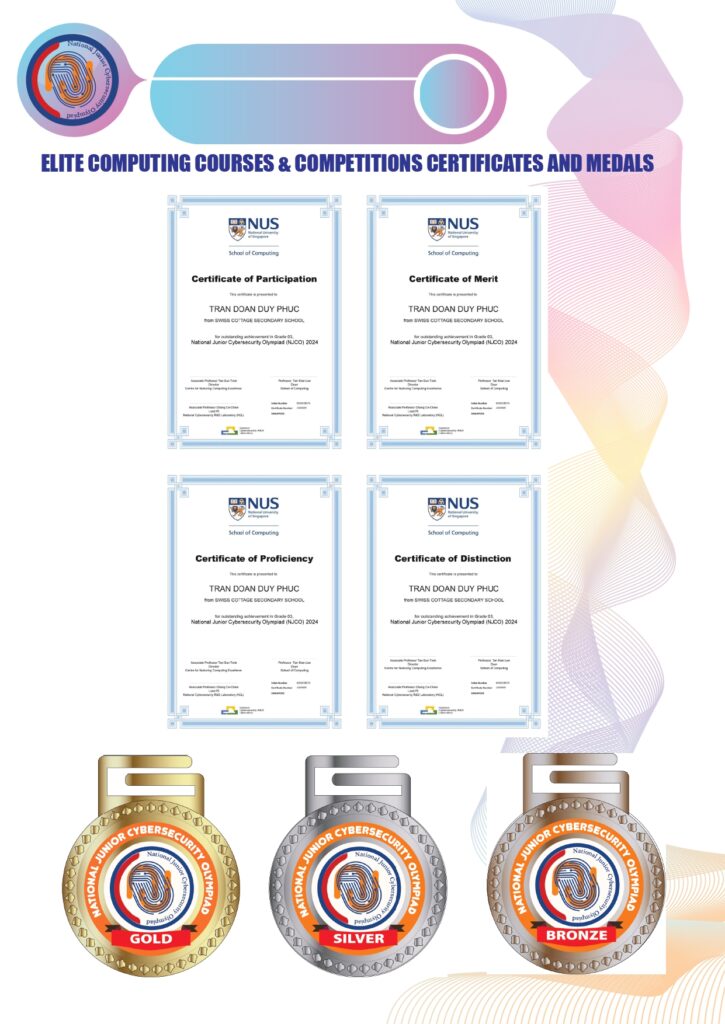
National Junior Cybersecurity Olympiad (NJCO)
(Free Learning Videos for NUS, Singapore)
National Junior Informatics Olympiad (NJIO) an innovative approach designed to spark students’ interest in programming by leveraging the principles of computational thinking and block programming. This statement explains how NJIO accomplishes this goal by breaking down complex problems into manageable parts, fostering an engaging and accessible learning environment.
Popularize the field of cybersecurity among high school and university students, organize additional training in cybersecurity to enhance students’ knowledge and interest in a possible future profession, and stimulate the desire to study additional technology and cybersecurity topics.
Who is NJCO for?
The NJCO is designed for students in grades 8 through 12 and first and second-year undergraduates. The course and the exam will be the same for all students, although the classifcation will take place within each grade.
The NJCO course features 4 pre-recorded online video lessons, each 2 hours long, totaling 8 hours of content, tailored specifcally for high school and university students. Designed by the National Cybersecurity R&D Lab (NCL) and the Centre for Nurturing Computing Excellence (CeNCE), both hosted at the School of Computing, NUS, the course allows students to engage with the material at their own pace. This flexible learning format ensures that students can pause, rewind, and revisit lessons any time and from anywhere, maximizing their understanding of the various topics outlined in the syllabus.
The NJCO contest, taken after the workshop that precedes it, will consist of 40 multiple-choice questions divided into 10 questions for each topic presented in the Syllabus. Each correct answer will be awarded 2.5 points, and no points will be deducted for blank or incorrect answers.
The awards will adhere to CenCE’s classifcation criteria, followed by the NOI. Accordingly, let be the total number of participants in the NJCO competition. Based on the ranking and scores of these participants, the following proportions will determine the distribution of awards:
• Gold Medals: about 1/12 of the contestants in each grade (Top 8.3%).
• Silver Medals: about 1/6 of the contestants in each grade (Next 16.7%).
• Bronze Medals: about 1/4 of the contestants in each grade (Next 25%).
• Topic 1: Cryptography
This topic introduces Cryptography, including encryption, hash techniques, pitfalls, and its historical context. These concepts are of fundamental importance in laying the foundations of cybersecurity. Students will learn and experience adversarial thinking through examples, understand what cryptography can achieve, and become familiar with some common types of cryptography and its intriguing techniques.
• Topic 2: Networking Fundamentals
This topic introduces adversarial thinking in networks, network discovery through the Wireshark tool, and the Era of Digitalization. Students will also learn how to trace the network journey from the URL to a webpage, gaining an overview of the source page and exploring the functionalities of the Wireshark network tool.
• Topic 3: Red Teaming & Introduction to CTFs
This topic introduces the fundamental concepts of Capture the Flag (CTF) competitions and their many categories. In addition, students will become familiar with Linux operating systems, including basic commands, file permissions and processing, and how to install software and tools in a Linux environment. Furthermore, students will explore the programming languages commonly used to solve CTF challenges, supplemented with practical CTF demonstrations.
• Topic 4: Digital Forensics
This topic introduces Digital Forensics, covering the main stages of the digital forensics process, such as the identification, preservation, collection, examination, analysis, and presentation of digital evidence. Students will explore various types of digital evidence, such as Network Traffic Logs, Memory Dumps, Data Imaging, and File System Artifacts. Additionally, students will become familiar with the tools commonly used in forensic investigations. Hands-on exercises will provide practical experience in the application of forensic techniques and tools in real-world scenarios.
REGISTRATION LAST DATE : 18th September 2025
EXAM DATE : 28th September 2025 Online
Rs. 2200/-
This Fees include Free Recorded Learning Videos


